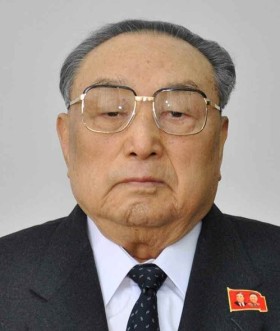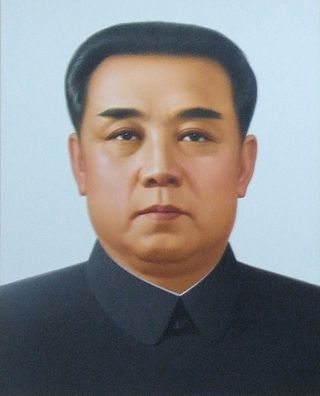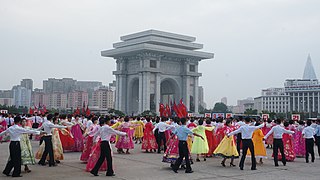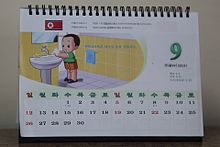
Juche, officially the Juche idea, is a component of Kimilsungism–Kimjongilism, the state ideology of North Korea and the official ideology of the Workers' Party of Korea. North Korean sources attribute its conceptualization to Kim Il Sung, the country's founder and first leader. Juche was originally regarded as a variant of Marxism–Leninism until Kim Jong Il, Kim Il Sung's son and successor, declared it a distinct ideology in the 1970s. Kim Jong Il further developed Juche in the 1980s and 1990s by making ideological breaks from Marxism–Leninism and increasing the importance of his father's ideas.

The traditional Korean calendar or Dangun calendar is a lunisolar calendar. Dates are calculated from Korea's meridian, and observances and festivals are based in Korean culture.
Korean era names were titles adopted in historical Korea for the purpose of year identification and numbering. Era names were used during the period of Silla, Goguryeo, Balhae, Taebong, Goryeo, Joseon, and the Korean Empire. Various Korean regimes officially adopted the era names of Chinese dynasties.

The Korean Central News Agency (KCNA) (Korean: 조선중앙통신) is the state news agency of North Korea. The agency portrays the views of the North Korean government for both domestic and foreign consumption. It was established on December 5, 1946, and now features online coverage.

The eternal leaders of North Korea are mentions of deceased leaders of North Korea. The phrase was mentioned in a line of the preamble to the Constitution, as amended on 30 June 2016, and in subsequent revisions.

The Republic of China calendar, often shortened to the ROC calendar or the Minguo calendar, is a calendar used in Taiwan, Penghu, Kinmen, and Matsu. The calendar uses 1912, the year of the establishment of the Republic of China (ROC) in Nanjing, as the first year.
The award system of the Democratic People's Republic of Korea was initially created less than one month after the foundation of the Republic. During the years of Japanese occupation of Korea, many of the future leaders fled to the Soviet Union. During World War II many if not close to all party leaders and Korean People's Army commanders served in the Soviet Army and as such adopted many of the Soviet awards criteria for their own. During the late 1940s and until the Sino-Soviet Split in late 1958, orders and titles were made in the Soviet Money Mints in Moscow or Leningrad. Soviet made awards were modeled after Soviet orders and made of sterling silver. Initially the orders were attached to clothing with a screw-plate, but after Soviet production stopped, production was moved to North Korea. The screwback was replaced with a pin and the silver content was replaced with cheap tin. With the exception of a few examples of modern orders, Soviet and Czech KPA awards are the most sought after in current militaria markets.

Kim Yong-ju was a North Korean politician and the younger brother of Kim Il Sung, who ruled North Korea from 1948 to 1994. Under his brother's rule, Kim Yong-ju held key posts including Politburo member in the Workers' Party of Korea (WPK) during the 1960s and early 1970s, but he fell out of favour in 1974 following a power struggle with Kim Jong Il. From 1998 until his death in 2021, he held the ceremonial position of Honorary Vice President of the Presidium of the Supreme People's Assembly (SPA), North Korea's parliament.

The North Korean cult of personality surrounding the Kim family has existed in North Korea for decades and can be found in many examples of North Korean culture. Although not acknowledged by the North Korean government, many defectors and Western visitors state there are often stiff penalties for those who criticize or do not show "proper" respect for the former leaders of the country, Kim Il Sung and Kim Jong Il, officially referred to as "eternal leaders of Korea". The personality cult began soon after Kim Il Sung took power in 1948, and was greatly expanded after his death in 1994.

Kim Jong Il was the Supreme Leader of North Korea from 1994 to 2011.

Kim Il Sung was the leader of North Korea for 46 years, from its establishment in 1948 until his death in 1994.

The Day of the Sun is an annual public holiday in North Korea on 15 April, the birth anniversary of Kim Il Sung, founder and Eternal President of North Korea. It is the most important national holiday in the country, and is considered to be the North Korean equivalent of Christmas. Kim's birthday, which had been an official holiday since 1968, was renamed Day of the Sun in 1997, three years after his death. The name takes its significance from his name: Il-sung.

Upon its liberation in 1945 and subsequent foundation in 1948, North Korea adopted national symbols distinct from the national symbols of South Korea. The traditional flag of Korea, the Taegukgi, and the symbol Taeguk, were swapped for socialist symbols.

The Order of Kim Jong Il is a North Korean order named after Kim Jong Il, the former leader of North Korea. It is the highest order of North Korea, along with the Order of Kim Il Sung, and only second to one honorary title, the Hero of Labour.
The Kim Il Sung Prize (Korean: 김일성상) is an award given by the Government of North Korea to persons in various fields who demonstrate exemplary service to the values of Juche idea. Past winners include the Korean composer Kim Won-gyun, judoka Kye Sun-hui, and the Arirang Festival.

The Day of the Shining Star is a public holiday in North Korea falling on 16 February, the anniversary of the birth of the country's second leader, Kim Jong Il. Along with the Day of the Sun, the birthday of his father Kim Il Sung, it is the most important public holiday in the country.

The Day of Songun is a public holiday in North Korea celebrated on 25 August annually to commemorate the beginning of Kim Jong Il's Songun (military-first) leadership in 1960.

Kim Jong Un has been the supreme leader of North Korea since the death of Kim Jong Il in 2011.

Chongnyon Jonwi is a daily newspaper in North Korea. It is the official organ of the Central Committee of the Socialist Patriotic Youth League. It is one of the three most important newspapers in the country, the other two being Rodong Sinmun and Joson Inmingun. Chongnyon Jonwi is particularly known for jointly publishing New Year editorials with the two papers under the rule of Kim Jong Il. Most of its regular articles are commentary on the contents of Rodong Sinmun from a youth perspective. The editor-in-chief is Choe Sun-chol.















